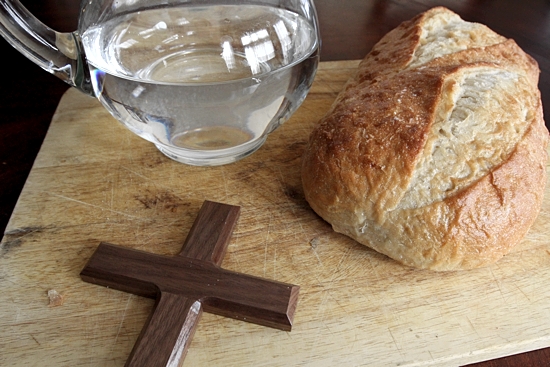Lenten discipline ripe with life, love and freedom, adherents say

When Casey Boerner discusses Lent with her Sunday school students at Immaculate Conception in Watertown, she uses sports metaphors. She compares the Lenten journey to the way athletes approach a big competition. Catholics, like athletes-in-training, dig a bit deeper and work a bit harder to prepare for the victory of Easter morning, she said.
Boerner, a graduate student in the masters of education program at the University of St. Thomas in St. Paul, considers fasting a critical part of her spiritual training regimen.
“If you are serious about becoming a good athlete, you want to know the best way to train,” Boerner said. “You are not intimidated by an intense workout, because it helps you get stronger and reach your goal.”
Boerner’s year-round fasting routine includes small meals and abstinence from sweets and meat every Wednesday and Friday. Though she finds forgoing dessert especially difficult, Boerner sincerely enjoys the challenge of fasting.
“It’s not so much about what you are giving up,” Boerner explained. “It’s about making a small gift to God that unites the body, heart, soul and will, all in one.”

Number two in a three-part series on the three basic pillars of Lent: almsgiving, fasting and prayer. In honor of the Year of Consecrated Life, each feature includes members of religious communities who are deeply living out these spiritual practices all year long.
Like prayer and almsgiving, fasting is a spiritual discipline rooted in Scripture and practiced by the earliest Christians. Lent is specifically tied to the 40 days Jesus spent fasting in the desert after his baptism.
During Lent, the Church requires abstinence from meat on all Fridays for those 14 and older. On Ash Wednesday and Good Friday, Catholics aged 18 to 59 are obligated to fast (one full meal and two small meals) and abstain from meat. The sick, pregnant and nursing mothers are exempt.
Boerner believes regular fasting strengthens her faith and leads her closer to God’s love. She encourages others to experiment with fasting from food, social media or other activities to foster self-discipline that could benefit all areas of life. Boerner is inspired by a quote she adapts from St. Catherine of Siena: “If we can become the best version of ourself, we will set the world on fire with a deep and authentic love.”
Beginning the fast
Several passionate fasters offered these tips to help others get started or enhance their current fasting practices.
- Avoid eating between meals on Wednesdays.
- Avoid social media one night per week.
- Skip one meal this week and give the money for the meal to a charity or food shelf.
- Instead of going out for lunch tomorrow, go to church during your lunch hour and eat a simple bag lunch on your return trip.
- Instead of browsing the Internet on your cell phone while you are waiting, pray.
- Replace 15 minutes of your evening Twitter, Instagram or Facebook time with browsing Catholic news, letters from Pope Francis or biographies of saints.
Fasting for love
That love of God and neighbor inspires a commitment to daily fasting for the Poor Clares of Minneapolis.
The sisters abstain from meat and snacks nearly year-round. They eat a sensible noon meal together each day, but eat simple, sparse breakfasts and suppers.
The Poor Clare fasting tradition began in the 13th century with their foundress, St. Clare of Assisi, who began a Franciscan community for women. The sisters describe St. Clare as a “rigorous faster” who needed to be reminded to eat in order to have the strength to pray and serve others. This balancing act between prayer, fasting and almsgiving provides the foundation for current Poor Clares, including Sister Beth Lynn, who entered the community in 1958.
“Prayer, fasting and almsgiving are a trinity that needs to be expressed together,” she said. “If too much emphasis is on one or the other they get out of kilter.”

Sister Beth pointed to examples of fasting in Scripture, including several verses from Isaiah calling people to fast prayerfully and joyfully in service to others.
Isaiah 58:6-7 reads: “The kind of fasting I want is this: Remove the chains of oppression and the yoke of injustice, and let the oppressed go free. Share your food with the hungry and open your homes to homeless poor. Give clothes to those who have nothing to wear.”
The Poor Clares encourage each person to make this passage come alive in their own way by being aware of daily opportunities that transform fasting from self-focus to focus on others, Sister Beth said.
In St. Paul, the Poor Clares’ fellow Franciscans, the Franciscan Brothers of Peace, focus their year-round Wednesday and Friday fasting on world peace. Their communal meal on fast evenings usually includes meatless soup and bread.
During Lent, the brothers deepen the intensity of prayer, fasting and almsgiving as they participate in the 40 Days for Life, a global pro-life campaign. The brothers abstain from meat for all 40 days of Lent, excluding Sundays, to promote the “Gospel of Life” for the elderly and the unborn.
Although fasting practices and purposes vary, good and productive fasts are intended to make space for the Lord to work in people’s lives.
“Fasting is powerful for overcoming sin and for growth and self-mastery,” said Father Jeff Huard, director of spiritual formation at the St. Paul Seminary School of Divinity. “It’s an expression of love and prayer that makes room for the Lord.”
Seeking detachment

As newlyweds, Gordy DeMarais and his wife, Teresa, made a deliberate decision to practice and celebrate their Catholic faith as a family.
Six children and 30 years later, the DeMaraises, who regularly attend both St. Joseph in West St. Paul and St. Louis, King of France in St. Paul, make fasting a family event during Lent. Above and beyond the standard obligations of the Church, sparse Wednesday dinners include bread, peanut butter and cheese. Soup and bread make up the remainder of the weekday dinners. Monday through Saturday, family members also abstain from the non-essential use of media and devices.
Why do they give up so much during Lent? Detachment and freedom.
“The fruit of the practice of fasting is the detachment,” said DeMarais, executive director of St. Paul’s Outreach, a ministry to college students based in the Twin Cities. “When we grow less dependent on these abundant things, we realize we can be happy and thrive without them. It seems hard at first, but after you embrace it, you experience a kind of freedom and closeness to God.”
This sense of freedom feels especially strong when the DeMarais family spends an evening at home during their Lenten media fast. Instead of being consumed and distracted by devices, the family experiences a deepening of their relationships with each other and with God, Gordy DeMarais said.
He advises Catholics not to fall into the mindset that the Church is trying to deprive anyone of happiness or pleasure. Instead, Catholics should see fasting as an invitation to a life filled with joy and freedom, he said, adding that fasting offers self-control needed to live generously with God and for others.
DeMarais also encourages fasting Catholics to ask God for help and perseverance, even after failure.
“God’s mercy is renewed for us every day,” he said. “The only real failure is the failure to begin again.”
For more information about fasting and abstinence, visit the U.S. Conference of Catholic Bishops’ website.




